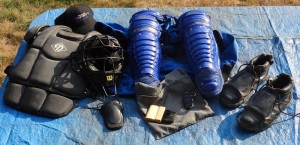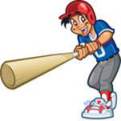Home Plate Umpiring Essentials
What safety precautions should I take?
Minimum safety gear you'll need:
- Mask with throat dangler
- Chest protector
- Shin guards
- Men's safety cup
Optional safety gear you'll wish you had: - Steel-toed shoes
Non safety equipment you'll need:
- Hat (preferably with short bill)
- Plate brush
- Ball bag
- Indicator (for keeping track of balls, strikes, outs)
More on face masks
- It should have a somewhat loose fit, so there is some give when the ball hits it. Some of the newer masks have additional skull caps and others are built like hockey/goalie style helmets. If you follow proper technique, a traditional mask with throat protector will work fine.
More on chest protectors
- Your chest protector should fit snugly. You may find League-provided protectors are worn and droop, exposing your collarbone and shoulder. Wear a tight-fitting shirt (preferably umpire shirt) over your chest protector to help keep it in place. Besides, a shirt outside the protector always looks more professional.
More on steel toed shoes
- Don't wait until you lose a big toenail to a pitch in the dirt before deciding to protect your feet. Plate umpire shoes with steel toes are available at specialty sports stores or online. Even an old pair of work boots is better than tennis shoes.
You can find great deals and quality gear at the following online suppliers of umpire gear
Umpire gear does a great job of protecting you if you follow proper plate mechanics
- Put your mask on before you take your place behind the plate. Unexpected pitches can appear out of nowhere, even during a dead ball situation. Better to have your mask on at all times behind the plate.
- Don't stand too close to the catcher. It's better to stay back a bit from the catcher, especially if he is in tight to the plate. By staying back a bit, you'll avoid taking an
over-swing of the bat to the backside of the head.
- Look straight ahead and minimize your head movement. A mask does a great job, but not if your head is tipping down, exposing the top of your noggin. And don't flinch to the side and expose your temples. Look straight ahead and follow the ball with your eyes, not your head.
- Protect your hands from the ball. Keep one arm tucked inside to your stomach and the other hand behind your back. Alternatively, you can place the hand from your stomach and hide it behind your thigh. Be sure not to lean forward as you squat.
Direct batters to a distance when tending to the plate
- When you call time to tend to something at the plate, direct the batter to leave the batter’s box and wait at a distance. For example, when you need to brush the plate or help a catcher with his gear. A batter (typically younger ages), might take a practice swing when you or your catcher are most vulnerable.
Back to: Home Plate Umpiring starting page
or
Back to: Quick Start page




